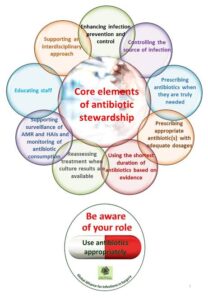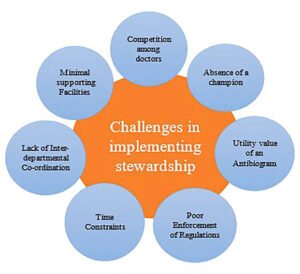Back to: MICROBIOLOGY 300 LEVEL
Welcome to class!
You’re right on time for another important lesson. Today’s topic is Antibiotic Stewardship—a concept that’s not just for scientists and doctors, but for every informed citizen, especially here in Nigeria where antibiotics are often used without prescriptions. As a microbiology student, understanding antibiotic stewardship will help you play a key role in protecting our people from drug-resistant infections and making sure antibiotics remain effective for future generations.
Antibiotic Stewardship
What is Antibiotic Stewardship?
Antibiotic stewardship simply means using antibiotics responsibly and wisely. It involves choosing the right antibiotic, at the right dose, for the right duration, and only when truly necessary. The goal is to cure infections while preventing misuse and reducing resistance.

Let’s imagine a child in Lagos with a cold caused by a virus. If he is given amoxicillin (an antibiotic), it won’t work—because antibiotics don’t kill viruses. But worse, it gives bacteria in his body a chance to become resistant. That’s where antibiotic stewardship comes in—to guide the correct use of these life-saving drugs.
Why is it important?
Antibiotic resistance is rising in Nigeria and worldwide.
Common infections like pneumonia, typhoid, or urinary tract infections are getting harder to treat.
New antibiotics are not being developed fast enough to replace the ones that stop working.
If we lose the power of antibiotics, even minor cuts or surgeries could become deadly.
Principles of Antibiotic Stewardship
Here are the key ideas behind good antibiotic use:
1. Use antibiotics only when needed
Antibiotics should only be prescribed for bacterial infections, not for viral infections like colds, flu, or COVID-19.
2. Choose the right antibiotic
Prescribers should use lab test results (e.g., culture and sensitivity tests) to choose an antibiotic that targets the specific bacteria causing the illness.
3. Use the correct dose and duration
Taking too little or stopping antibiotics too early can lead to resistance. Always complete the full course, even if symptoms improve early.
4. Monitor and evaluate antibiotic use
Hospitals and clinics should regularly check how antibiotics are being used and educate staff to improve their prescribing habits.
5. Educate the public
Community awareness is crucial. People need to know that antibiotics are not magic cures for every illness.

Imagine a clinic in Jos that trains its staff on stewardship. They stop prescribing antibiotics for viral sore throats and start using lab tests more. Over time, fewer patients develop resistance—and the clinic sees better outcomes.
Summary
- Antibiotic stewardship means using antibiotics in a smart and responsible way.
- It helps protect antibiotics from becoming useless due to resistance.
- The key is to use the right drug, at the right time, for the right patient, in the right amount.
- Hospitals, health workers, and the public all have a role to play.
Evaluation
- What does antibiotic stewardship aim to prevent?
- Why shouldn’t antibiotics be used to treat viral infections?
- List two principles of good antibiotic use.
This lesson makes you a guardian of one of modern medicine’s greatest tools—antibiotics. Keep learning, keep growing, and remember, you are the future of microbiology in Africa. Afrilearn believes in you, and we’re excited for all the good you’ll do. Let’s meet in the next class!
